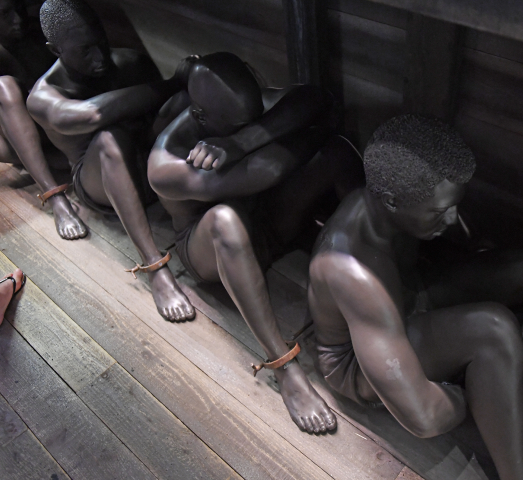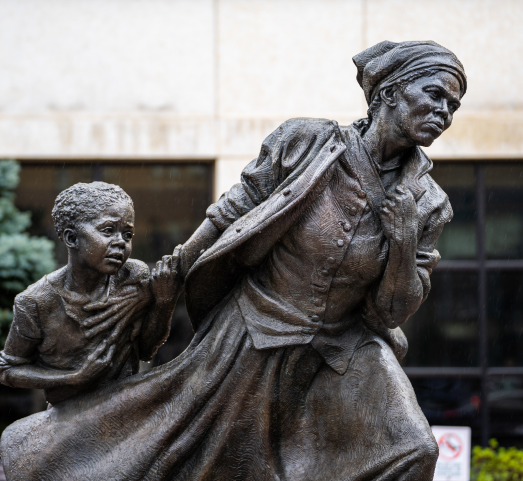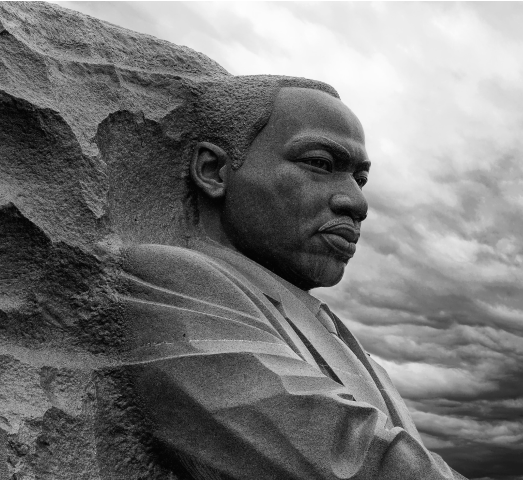
Reparations
Background.
The United States of America would not be a world superpower without the nearly two and half centuries of free labor from its Black chattel slaves. In the North, employees of mills, railroads, insurance companies, banks and other financial institutions were just as dependent on the slave economy as the South, especially after cotton became king. The wealth generated from the inhumanity of American chattel slavery is indisputably a principal reason for the United States’ current economic and geopolitical standing: the four million chattel slaves in America had a combined economic value greater than the aggregate industrial capital in this country before the Civil War started. The chattel slaves were wealth in and of themselves, and they created wealth for their enslavers via the fruits of their labor and their bodies. Because they had no autonomy over their own bodies, they generated wealth just by giving birth to new slaves who could be sold or used to serve their enslavers’ families for generations.
Then we had the Civil War, emancipation of the chattel slaves, and the aftermath – a period in which everyone most certainly did not live happily ever after. The former slaves, now Freedmen, were emancipated into crushing poverty. As a group of people, they had no money and owned nothing in their own name. Many of their families were not even intact because their enslavers had sold and separated their loved ones for profit or spite. Breaking out of poverty is nearly impossible with nothing to build on or government assistance. There were several proposals to provide for the Freedmen including reparations and pensions, but in the end, America did none of these things for them. Some of their white enslavers, however, were paid cash reparations for the loss of their chattel slaves. Moreover, under land policies such as the Homestead Acts, the U.S. government continued to grant millions of acres of farmable land to white citizens and white immigrants, while limiting access by the former chattel slaves.


The Homestead Acts constituted the most far-reaching redistributive policy in the history of America, both because of their contribution to the racial wealth gap and their tacit endorsement of Black poverty as an official national policy. In 2000, it was estimated that nearly a quarter of the white U.S. adult population could trace their legacy of wealth and property ownership to this one entitlement program. The fact that the former chattel slaves were excluded from this policy, not in letter but in practice, became a template for federal programs that our government would use for the next 150 years.
Once the chattel slaves were freed, the paramount question was what to do with them. And after they died, that question became what to do with their descendants. Sadly, America repeatedly answered these questions with a series of selective and discretionary mechanisms, both overt and covert, for denying, excluding, policing, plundering, and preying upon these formerly enslaved citizens and their descendants. These mechanisms were all designed to maintain white supremacy and deprive the former chattel slaves and their descendants of not just civil and legal rights but also of economic opportunities to create wealth. There is a cost for these government sanctioned actions that must be paid, and that payment must be made as reparations and is long past due.
Our Position on
Reparations.
The Freeman Initiative has taken a position on reparations: we are unanimously in favor of reparations for descendants of American chattel slavery, an ethnically unique group of people who are indigenous to the United States and have no identifiable connection to any other particular country as a group. Their history lies here in America. Reparations will result in inequality reduction and opportunity enhancement that is consistent with the goals and ideals America purports to advance for its citizens. We acknowledge that there could be other people who may have claims for reparations against the United States but such groups are not the focus of Freeman Initiative’s advocacy.
Our position on reparations most closely aligns with that espoused by the American Descendants of Slavery Advocacy Foundation (“ADOSAF”). Accordingly, we will work collaboratively with ADOSAF for recognition of a lineage specific designation for descendants of American chattel slavery and have no issue supporting both their proposed designation of American Descendants of Slavery (“ADOS”), and a federally administered reparations package for such citizens deemed eligible persons under that lineage designation. There may be a place for state and local reparations, but not as a primary remedial measure. We also support the establishment of a Bureau of ADOS Affairs headed by or informed by descendants of American chattel slavery to oversee administration of the reparations package, maintain a genealogy registry, and implement future programs to address the needs of ADOS people.
Why We Support
Reparations for ADOS.


The wealth disparities experienced by descendants of American chattel slavery are rooted in historic injustices committed or sanctioned by our government, as well as more recent public policies and institutional systems that continue to fuel and exacerbate injustices for this group of legacy American citizens. Accordingly, reparations for the wealth gap are the only meaningful solution to this American made problem.
As mentioned earlier with just the Homestead Acts, the wealth that was created during American chattel slavery remains today for many white families. Yes, white slaveowners experienced huge losses of wealth after the American Civil War, and emancipation ended chattel slavery. However, their substantially reduced fortunes were rapidly recovered due to their social networks and political connections. In fact, most of these former slave-owning white households rebuilt much of the lost wealth in just one generation, and within two generations, almost all of the wealth had been recovered. Therefore, it is disingenuous to assert that Americans no longer need to take responsibility for slavery and its legacies, including wealth, because that wealth is not solely a matter of the past.
Neither are the injuries caused or continuing to be inflicted upon descendants of American chattel slavery a matter of the past. Congress created the Freedmen’s Bureau and then hamstrung it at every opportunity. It did not matter what “Deal” was in play (Square Deal, New Deal, etc.); it was no deal for us or our ancestors. The reason America does not have universal health care is because of racism. We still have major health disparities that are a result of being enslaved and its corresponding consequence of lack of wealth. As during slavery, we are still the subject of medical experiments as the unethical PolyHeme clinical trial shows from the early 2000s.
Additionally, instead of investments to repair and sustain our economically isolated communities, they are disproportionately at risk for displacement through eminent domain and gentrification.
The present frequently mirrors the past, as in the 1990s case of Atlanta lawmakers displacing more than 30,000 predominately Black families to create Centennial Olympic Park – much like New York City lawmakers destroying a thriving Black community in the 1850s to create Central Park. Lack of wealth keeps descendants of American chattel slavery from accessing safe, affordable housing. Structural racism in America’s housing system ensures that we either are denied credit, loans, insurance, and fair mortgages via mechanisms like redlining, or we are steered into predatory loans, subprime mortgages, excessive fees, and all the other trappings reverse redlining has to offer. We can find no period in American history where our people or our communities were not being sacrificed to feed American growth, profit, and expansion.
Not supporting reparations for the descendants of American chattel slavery demonstrates a profound lack of historical literacy about the United States, race, and economics. While chattel slavery in America created the initial disparities in wealth that continue today between whites and the descendants of American chattel slaves, it was our government and the influence of white institutions and white mob violence such as the Red Summer of 1919, that further injured and impeded both the former chattel slaves AND their descendants from building wealth in this country after slavery. The injuries and impediments occurred in a myriad of ways, including but not limited to:
- Billions of dollars in unpaid labor
- Failure of the federal government to adequately protect and provision the newly freed chattel slaves
- Exclusion from Homestead Acts and discrimination in subsequent land grant initiatives
- Denial of pensions to the former chattel slaves
- Limited access to financial institutions and credit
- Limited ability to purchase land
- Black Codes 1865 -1867 (replaced the Slave Codes but were the same social control laws)
- Failure to make good on the 1865 Special Field Orders No. 15 (“Forty acres and a mule“)
- Failure to maintain Reconstruction Era policies like political representation and the Freedmen Bureau Act
- Civil Rights Act 1875 (ignored and declared unconstitutional in 1883)
- Jim Crow Laws 1876 – 1965
- Grandfather clauses, poll taxes, property ownership, and literacy tests (denied right to vote)
- Cash bail system
- Criminalization of poverty and unemployment (uniquely American concepts)
- Mass incarceration, convict leasing and chain gangs
- Exploitative labor contracts – most former chattel slaves could not read
- More forced labor (often paid in scrip) in the form of peonage, sharecropping, tenant farming
- Congressional mismanagement of the Freedman’s Savings Bank (nearly $3 million lost in 1874)
- Lack of universal health care
- Widespread terrorism via unchecked lynchings, rape, arson and whitecapping
- Red Summer of 1919 including Elaine, AR; Chicago, IL; Omaha, NE
- Other massacres and razing of Black communities by violent white mobs including Tulsa, OK (1921); Forsyth County, GA (1912); Ocoee, FL (1920); Hamburg, SC (1876); East St. Louis, MO (1917); Colfax, LA (1873); Wilmington, NC (1898); Atlanta, GA (1906); Leflore County, FL (1889); Vicksburg, MS (1874); Ellenton, SC (1876); Opelousas, LA (1868); Rosewood, FL (1923); Thibodaux, LA (1887)
- Ethnic cleansings including Indiana Avenue (Indianapolis), IN (1950s); Tulia, TX (2019); Azusa, CA (1992 – 2010); Forsyth County, GA (1912); Erwin, TN (1918); Catcher, AR (1923); Washington County, IN (1923); Corbin, KY (1919); Sharp County, AR (1906); Laurel County, KY (1919); Boone County, AR (1905); Vermillion County, IN (1923); Pierce County, MO (1901); Harrison, AR (1905);
- Thousands of individual murders of former chattel slaves (non-lynchings)
- Thousands of individual whippings and beatings of former chattel slaves
- Thousands of sundown counties and towns (1880 – present)
- Land thefts including heirs’ property
- Exclusion from the Wagner Acts of 1935 (Collective bargaining rights/unions)
- Unemployment of Black sharecroppers caused by the Agricultural Adjustment Act
- Exclusion from the Fair Labor Standards Act of 1938
- Black veterans denied the promises of the 1944 Servicemen’s Readjustment Act (“GI Bill”)
- Exclusion from the Aid to Dependent Children Program
- Discrimination in education
- Discrimination in employment and the labor market
- Federal sanctioning of lower wages for Black people
- Housing discrimination
- Redlining and other discrimination in mortgage lending
- Environmental racism
- Forced mass displacement of our communities (via mob violence and eminent domain seizures)
- Highway Act of 1956 effectuated systematic gutting of Black communities
- Segregation (separate but equal)
- Forced sterilizations under eugenics programs in the U.S.
- Medical experimentation
- Ongoing loan discrimination against Black farmers by the US Department of Agriculture
- War on Poverty in 1964
- War on Drugs in 1971 – now 50+ years of racialized incarceration
- Crime Bill of 1984 – contributed to ongoing rampant police misconduct and racial profiling, expanded application of the death penalty, life sentences for juveniles, three strikes law
- Stop and Frisk Racial Profiling
- Ongoing school to prison pipeline for Black youth / Zero Tolerance policies
- Continuing underfunding of Black land-grant colleges and universities (HBCUs)
- Continuing redlining and lending discrimination (2023 examples include Ameris Bank, American Bank of Oklahoma, Washington Trust Co., ESSA Bank & Trust, Park National Bank, City National, KeyBank)
- Continuing disenfranchisement, voter suppression, gerrymandering and the creation of “majority-minority” districts right up until the present day
- Food deserts and a proliferation of dollar stores
All of these things have produced the outcomes intended. This is how wealth was stolen from the freed chattel slaves and their descendants before it even had the opportunity to grow. There is no plausible deniability for the effect these dehumanizing, racist ideas and policies had on them as a group. They should have been allowed to share in this country’s collective resources and opportunities like any other American citizen. The current poverty levels and financial struggles experienced by descendants of American chattel slavery are by design. The Freedmen were never compensated for their economic contributions to America. Additionally, they and their descendants were repeatedly targeted for federal and state sanctioned labor exploitation, mass incarceration, land thefts, wage thefts, credit and predatory lending, exclusion, disenfranchisement, plunder, terrorism (lynchings), racial cleansings (massacres and displacements), redlining and segregation – all of which effectively impeded the accumulation of wealth for this group of citizens.
As to who pays for reparations, we reject the specious arguments that suggest only some individual Americans with roots that run as deep as ours in this country are liable. Reparations for descendants of American chattel slaves are first and foremost a federal government debt; hence, it does not matter whether you or your ancestors were here participating in any of the lineage-based “festivities.” America’s ills, injustices, and debts are our collective responsibility, and as such, America pays. If you immigrate here, America still pays its debts. There is no statute of limitations that can be applied when the original theft of labor and wages was not only uncompensated but was deliberately exacerbated by government-sanctioned policies and actions that continued to rob us of economic opportunities. The thefts are still happening, so the injuries are still happening too. The data shows our government has consistently enabled and rewarded our enslavers and their descendants. Accordingly, our newest American immigrants must recognize and grapple with our country’s history of legacy thefts from this lineage, because misunderstanding it essentially perpetuates harmful stereotypes and oppression. Our old and new Americans both need to understand that reparations are not a mere “redistribution” of wealth, but a form of restitution to compensate for both the historical injustices and enduring consequences of American chattel slavery and segregation, which are shockingly reflected in the staggering racial wealth gap.


It will not be extraordinarily difficult to identify descendants of American chattel slavery. After all, lots of historical documentation remains about chattel slaves because it was used for recapture, insurance claims, and even reparation payments to white slaveowners when emancipation was decreed. In general, an eligible person should be a U.S citizen who has identified as Negro, Colored, Black, or African American throughout their life on government documentation. They should be able to present a government-issued ID, birth certificate, or census record identifying a direct ancestor as Negro, Colored, Black, or African American before 1965 and be able to trace their ancestry to at least one person that identified as Negro, Colored, Black, or who was an enslaved person in the United States between 1776 – 1865.
The U.S. government maintains census data that can be used to begin defining the potential pool of eligible citizens who were here prior to the mass immigration that began in 1965 and then cross-reference the list against immigration records for the initial sorting of potentially eligible persons. Moreover, the records of the Freedman’s Savings Bank and Freedmen’s Bureau remain intact as a useful genealogical resource for this purpose. A newly created government entity, Bureau of ADOS Affairs, should be charged with identifying and assisting eligible citizens to claim their individual share of the reparations package. Think of this agency as the natural successor to our nation’s short-lived Office of the Director of Negro Economics. However, the Freeman Initiative has no desire to see any of the old or new public or private reparations organizations contracted to provide the administrative functions we believe should reside within the purview of an agency such as the Bureau of ADOS Affairs.
As a final note, we understand that some people will disagree with us in whole or part, and that is okay. However, we at the Freedman Initiative would ask that you really examine why you feel the way you do. What if this had happened to you and your family in America? We would further ask if you do not agree with the totality of our position, then figure out what part(s) you could support and actually support those tenets. Today’s descendants of American chattel slaves are not that far removed from their ancestors. The last American chattel slave, Peter Mills, died in 1972. Moreover, many people reading this do not realize that our community only lost Daniel Smith the last son of an American chattel slave last year (2022). Lastly, it was only a few weeks ago, in October 2023, that we lost one of the last three survivors of the 1921 Tulsa Massacre. The past is our present no matter how much you might want to deny that fact.
Just people do not ignore injustices. They take action to meaningfully right any wrongs and put in place safeguards to prevent them from happening again. At the heart of our position on reparations, we are asking that other Americans stop buying into the belief that descendants of American chattel slavery have to be poor in order for everybody else to have enough. We are asking that other Americans stop exploiting descendants of American chattel slavery in order to benefit at our expense. As a group of American citizens with the least amount of power and wealth, it makes no sense to blame us for the class and other socioeconomic issues that plague this country. The reparations claim made by descendants of American chattel slavery is for payment on a debt made in America that is long past due.

